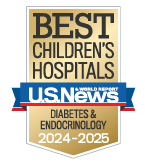22q11.2 Clinic
Nationally ranked by U.S. News & World Report

The Super Q Express Clinic at Children's Mercy provides expert medical care from a comprehensive team of clinicians for children with 22q11.2 deletion syndrome and 22q11.2 duplication.
What is 22q11.2 deletion syndrome?
22q11.2 deletion syndrome affects as many as 1 in 2,000 to 1 in 4,000 people worldwide. The syndrome was formerly known by several different names, including DiGeorge syndrome, velocardiofacial syndrome (VCFS), and Sphrintzen syndrome, but now we understand that these are all linked to the same chromosomal difference.
22q11.2 deletion syndrome occurs when a small amount of genetic material, known as a microdeletion, is missing on chromosome 22. As a result of the deletion, many body organs may be affected.
Not all children are affected in the same way—in fact, the condition can range from very mild, almost unnoticeable concerns to complex differences involving multiple systems of the body.
Symptoms of 22q11.2 deletion syndrome
Your child’s doctor may consider a diagnosis of 22q11.2 deletion syndrome if your child has one or more of the following issues:
- Certain heart defects present at birth
- Low calcium levels
- Immune system problems (i.e. a child with multiple infections)
- Cleft palate
- Speech and/or swallowing difficulties
- Behavior and learning disabilities
What is 22q11.2 duplication?
22q11.2 duplication is caused by an extra piece of genetic material on the 22nd chromosome. The duplication can cause a wide range of health issues. However, many children have no noticeable symptoms.
Symptoms of 22q11.2 duplication
Some symptoms that can occur include:
- Hypotonia (low muscle tone)
- Developmental delays
- Intellectual disability
- Psychiatric illness
Children with 22q duplication may also exhibit any of the features associated with 22q deletion.
What to expect at the SuperQ Express clinic
The SuperQ Express clinic has a railroad train theme because our focus is on bringing all your providers to you so that everyone is on track together. We care for your child from infancy through age 21, when we help them transition to adult care, so our focus is always on finding the best plan of care for your child over the long term.
Your appointment with the SuperQ Express team
Your family will come for a half-day visit to the clinic and may see as many as six different specialists throughout your appointment. Experts from cardiology, ENT/cleft palate, endocrinology, gastroenterology, genetics, immunology and hearing and speech are available to meet with you, depending on your child’s unique needs. A social worker and medical coordinator provide you with guidance and support as well.
This team-based approach to care means that you have fewer visits to the doctor. Plus, all of your child’s specialists are meeting together to create a coordinated plan of care. We are looking at your immediate concerns, but always in the context of your child’s health down the line as well.
Clinical Social Work services
One member of your child’s Super Q Express team is a clinical social worker. Social workers assist families with problem solving and coping with medical and non-medical stresses.
Some of the services social work provides include:
- Financial
- Information regarding Medicaid and disability eligibility
- Resources to assist with insurance co-pays
- Lodging and Transportation
- Ronald McDonald House referrals (for families living >50 miles away)
- Hotel lodging information
- Medicaid transportation
- School
- IEP
- 504 plans
- FMLA questions
- Discussion of advance directives and medical power of attorney
- Consent for treatment or release of information issues
- Support related to adjustment to a child’s medical condition
- Referrals to community resources
Information for health care providers
Requests for consultation at the clinic can be made by a family doctor, pediatrician, or specialist through the Provider Portal (select “Endocrine”) or by calling (816) 960-8820.
- Endocrinology and Diabetes
- 22q11.2 Clinic
- Childhood Diabetes Center
- Endocrine Disorders in Cancer Survivors
- GUIDE Clinic
- Polycystic Ovary Syndrome Clinic
- Prader-Willi Syndrome Clinic
- Rising T1DE Alliance
- Thyroid Nodule and Carcinoma Clinic
- Turner Syndrome
- Type 2 Diabetes Prevention Clinic
- Pediatric Endocrinology Fellowship
- Meet the Team
